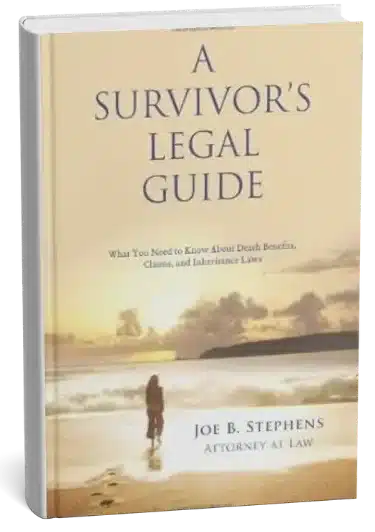Houston Work Injury Lawyer
Joe is one of the few Texas lawyers that is double board certified.
“No Legal Fees Until Joe Wins Your Case”
Content Reviewed by: Joe Stephens

Types of Houston Work Injuries We Handle
Our legal team is familiar with the blue-collar workers of Houston, TX. We are standing by to offer you a free case evaluation if you were injured on the job.
Construction Accidents
The labor of construction workers creates the office buildings, stores, highways, city streets and homes that make our nation a great place to live. Even though the recession drove down the number of employees in the industry, individuals who work in construction sustain more fatal injuries than employees in any other sector of private industry, according to the U.S. Department of Labor. In the most recent year for which data is available, 816 construction workers lost their lives – more than two people every day. Far more were injured or made ill by their work. If you’ve been hurt in a construction industry accident, contact Joe, a double board-certified personal injury attorney in Texas to discuss your case.
The most common construction site accidents include:
- Falls
- Equipment-related incidents
- Injury-causing contact with objects
- Heavy machinery accidents
- Exposure to toxic substances
- Electrical injuries
- Eye injuries
- Explosions
- Noise exposure
- Excavation accident
Refinery Accidents
Joe has handled multiple plant explosion cases, and other catastrophes at Houston Plants. He has fought in trial, and in the Courts of Appeal against Phillips, Crown Central Petroleum, Atlantic Richfield Company, Exxon-Mobile, Dow Chemical, and other industry giants. He understands that these company’s value profit over safety, despite what they say. He ought to know as he put himself through college over 25 years ago working in a similar environment in the Oklahoma Oil Fields. That is why he battles so hard.
The Most Common Type of Refinery Accidents Involve:
- Falling Accidents
- Defective Machinery
- Toxic Fumes
- Electrocutions
- Plant Explosions
- Fires and Burns
- Defective Scaffolding
- Lifting Heavy Objects
Oil & Gas Accidents
After the fiery explosion of a BP offshore drilling rig and subsequent disastrous oil leak into the pristine waters of the Gulf of Mexico, it would be difficult to find anyone in the U.S. who didn’t understand the far-reaching consequences of accidents that occur in the oil and gas industry. Loss of life at the moment an accident occurs can be compounded by further losses – of lives, health, livelihoods and more – in the aftermath of the initial event. While the industry provides much-needed sources of fuel and other products, its associated dangers can leave workers and others seriously injured. If you’ve been hurt by an oil or gas accident, you may be entitled to compensation.
The Occupational Safety & Health Administration monitors incidents in America’s workplaces to ensure that safe conditions exist. OSHA lists top reasons for which it cites oil and gas companies for violations as:
- Personal Protective Equipment
- Wiring Methods
- Sanitation
- Respiratory Protection
- Guarding of Floor & Wall Openings
- Fire Extinguishers
Offshore Maritime
Workers on offshore drilling platforms, seamen who man tugboats and other vessels, employees on fishing boats, and other individuals who work offshore may encounter many kinds of job-related hazards. When accidents occur and you suffer serious injuries, you want the assurance that you’ve chosen a top-rated accident attorney in Houston who has experience specifically in maritime law. Because this area of the law is particularly complex, consult a lawyer who focuses on such cases for advice about compensation for your injuries.
Common Offshore Accidents That May Cause Death Include:
- Falls
- Collisions with objects
- Explosions
- Crushing
- Cave-ins
- Electrocution
- Fires
- Asphyxiation
- Toxic substance exposure

Suffering an injury at work can turn your life upside down. Joe Stephens is ready to help you navigate your claim and fight for the full compensation you need to recover and move forward.
Helping Those Injured Offshore Understand the Jones Act
What is the Jones Act?
The Jones Act is a federal statute found at 46 United States Code 688 that was passed by the United States Congress that allows an injured employee to sue their employer for ALL the damages that the employee has suffered as a result of an injury. If the Jones Act applies to you, you will not be limited to collecting workers’ compensation benefits which consist of only medical payments and a small portion of your wages for a fixed period of time. Instead, if the Jones Act applies and your injury was caused by the negligence of your employer or a co-employee, you may then collect ALL of the damages that you have suffered from your employer.
These damages include money for pain and suffering, money for past and future medical expenses from a doctor that you choose, money for past and future loss of wages and fringe benefits that you may have suffered due to your injury, and any other money damages that you have suffered. Our Maritime lawyers can explain these damages to you and help you understand the Jones Act. It may give you extensive rights since you were working at a dangerous job on the water.
In order for the Jones Act to apply to you, you must qualify as a ‘seaman’ which means several things. To be a seaman, you must satisfy conditions at the time of your accident, such as being more or less permanently assigned to a vessel or fleet of vessels in navigation
The ‘more or less permanent’ assignment has been interpreted to generally mean that you have spent at least 30% of your time on ‘vessels’. So even if 65% to 70% of your time was spent off of the water on land or elsewhere, you may still satisfy the ‘permanent assignment’ requirement. Even if your accident occurred on land, you may still file a claim under the Jones Act if you were assigned to a vessel but only working on land temporarily.
Why Choose The Stephens Law Firm for Your Houston Work Injury Case?
When you’ve been injured on the job, especially in high-risk industries like refineries, offshore maritime operations, oil and gas, or construction, you need a lawyer who understands the complexities of your case. Here’s why The Stephens Law Firm is the trusted choice for work injury victims in Houston:
- Decades of Experience: Joe Stephens is a double board-certified attorney with over 30 years of experience handling workplace injury cases, including those governed by the Jones Act, federal maritime laws, and Texas labor laws.
- Industry Knowledge: With a background in the oil fields, Joe Stephens knows the challenges workers face and has successfully fought against major corporations to secure fair compensation.
- Proven Track Record: From refinery explosions to offshore rig accidents, Joe Stephens has won multi-million dollar settlements and verdicts for injured workers and their families.
- Comprehensive Support: Whether your case involves employer negligence, unsafe working conditions, or defective equipment, we provide personalized attention and aggressive representation.
- No Upfront Costs: We work on a contingency fee basis, meaning you don’t pay unless we win your case.
At The Stephens Law Firm, we are committed to helping Houston workers recover the compensation they deserve for medical bills, lost wages, pain, and suffering. Contact us today for a free consultation and let us help you get back on your feet.
Contact The Stephens Law Firm in Houston, TX
If you or a loved one has been injured due to someone else’s negligence, The Stephens Law Firm is here to help. With years of experience handling work injury cases in Houston, TX, we fight for the compensation you deserve.




